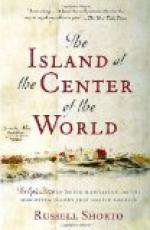[Illustration: View in Broad Street about 1740.]
CHAPTER XIV
Lord Lovelace and Robert Hunter
The new Governor arrived in the last months of the year 1708. He was John, Lord Lovelace. As there had been so much trouble caused by the governors appropriating money belonging to the citizens, he decided to take a very different course. He had the public accounts looked into, and said, “I wish it known to all the world that the public debt has not been contracted in my time.” And having said this (which made a fine impression) the Governor asked the Assembly to set aside enough money for him to run the affairs of the province for a number of years. This was to be called a permanent revenue. But the Assembly would do no such thing. In the midst of the discussion, Governor Lovelace died, five months after his arrival.
It was quite a year after the death of Lovelace before his successor came. This was Robert Hunter, a most exceptional man. His parents were poor, and when a boy he had run away from home and had joined the British army. By working very hard at his books when the army was not fighting, by studying in the soldiers’ quarters and on the battle-field, by making friends with officers of high rank, Hunter had grown to manhood brave, well educated, and of graceful manner. On coming to New York he at once made friends with many influential persons. His most important friendship was with Lewis Morris, whom he afterward appointed chief-justice. This Morris was a son of Richard Morris, an officer in Cromwell’s army, who had come to the province, purchased a manor ten miles square near Harlem, and called it Morrisania—by which name it is still known.
The year after Hunter arrived, New York joined with New England in a plan to conquer Canada (which belonged to the French) and join it to the English colonies. Money was raised, troops were gotten together, and ships and soldiers were sent from England. But when the attack was to be made, the English ships struck on the rocks in a fog off the coast of Canada, and eight of them sank with more than 800 men. This great loss put an end to the intended invasion. The soldiers returned home, where there was great sorrow at the dismal failure of a project that had cost so much money and so many lives.
Governor Hunter had only been in the province a short time when he began to urge the Assembly to grant him that permanent revenue that Lovelace had asked for. Queen Anne had said that he was to have it. But the Assembly would only grant him money from year to year.




